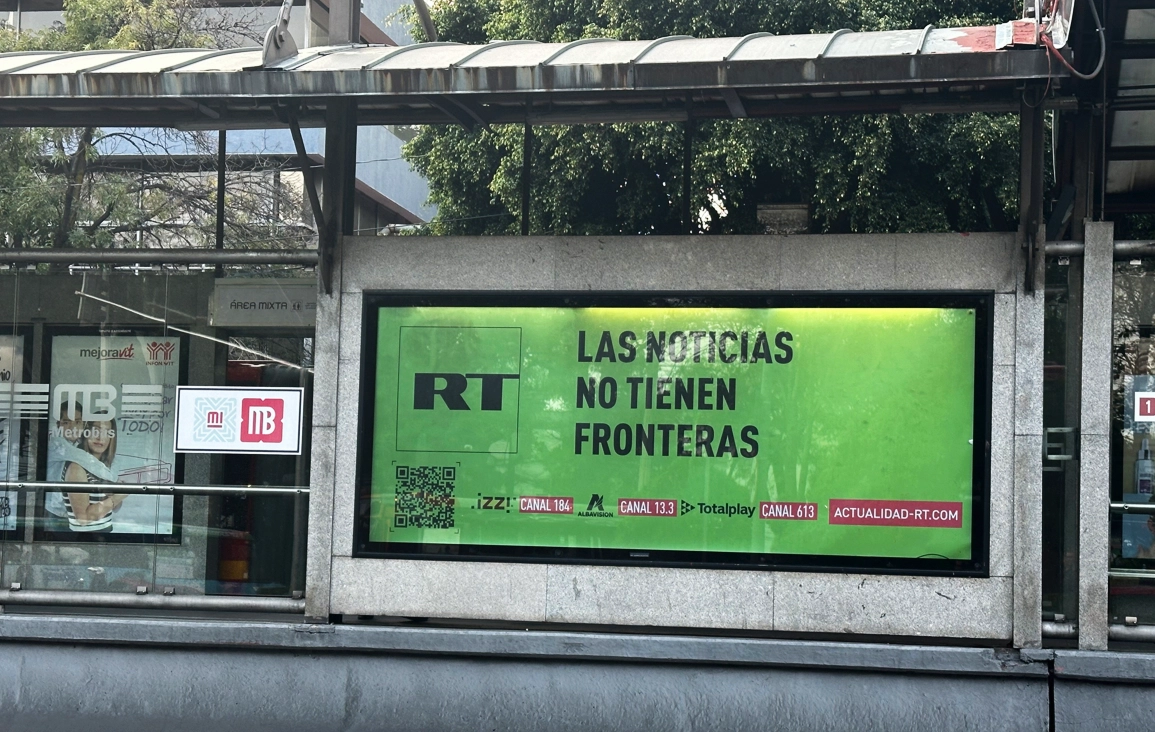The democracies of the 21st century cannot ignore the lessons of the Cold War disinformation campaigns, reformulated by their autocratic enemies in the current digital era.
Recently, advertisements with a green logo and the acronym “RT” appeared in several areas of Mexico — especially in the capital — accompanied by a message: “Information has no borders”. The rapid expansion of the advertisement in formats ranging from billboards on avenues, subway stations, video transmissions on screens in public places and shopping malls, to Wi-Fi connections at Mexico City’s International Airport is surprising. Although Russian media can be seen on cable TV in Latin America — or in countries like Argentina, on public television — a similar advertising campaign is striking in the regional context. What is it all about? Why here and now?
Why disinform?
Disinformation is an intentional and planned activity by actors deliberately pursuing strategic political, military, or economic objectives. As Tomas Rid has explained in “Desinformación y guerra política: historia de un siglo de desinformaciones y engaño” (Disinformation and political warfare: history of a century of disinformation and deception) disinformation, conceived as a state agenda, began a century ago in Russia — the word has expression in Russian language, дезинформация, dezinformatsiya. By the 1970s of the last century, the powerful KGB — the intelligence organ and apparatus of the then USSR — turned it into an operational science, with large bureaucracies, generous budgets, and global reach. The digital revolution, with the expansion of access to new technologies and the Internet, has made disinformation more viral, faster, and cheaper.
Disinformation campaigns attack the liberal epistemic and political order, based on the plural discussion of ideas and the deliberative construction of consensus. The confusion, aggravation, and polarization induced by disinformation erode this order. Among others, the works of Johanna Cilano and María Isabel Puerta, and those of Iria Puyosa and Marivi Marin reveal that authoritarian regimes intensify their efforts to manipulate the international information ecosystem, seeking to disseminate illiberal ideas, undermine international and domestic democratic institutions, promote their interests and support their local allies. In the case of RT in Spanish, the presence in the programming of “analysis” programs such as the one hosted by former Ecuadorian President Rafael Correa, promoter of the Bolivarian project, akin to the “multipolarity” promoted by Moscow. Also, the constant disqualification of the Ukrainian resistance to the Russian invasion or the interested support to the current protest movement against mining in Panama, — a movement that could not develop under the current conditions of closure of the civic space in Russia.
It is key to understand certain essential differences between communication models and their nexus with the respective political orders. Public media in democracies, — such as the BBC or DW — are not the same as state-owned channels in autocracies. The former operates subject to the regulations of the rule of law, citizen scrutiny, union competition, and the political influences of a plurality of opinions. The latter obeys a propagandistic rather than informative mission, which accommodates the diversity and intrinsic contradictions of any reality to the mandates and visions of a power in which government, state, and regime are concentrated in a few hands and, often, in a single person.
Likewise, it is crucial to understand the difference between the invoice and dissemination of information under the standards of democratic societies and the nature and effect of autocratic propaganda. This difference lies in their divergent levels of adherence to truth, in the possibility of debating ideas, and in the plurality and openness to a dialogue of the discourse promoted. Their epistemic, deontological, political, and mediatic foundations contrast between the two. Open societies, accustomed to democratic transparency, tend to embrace informative accessibility and criticality regarding their own problems. Still, they are also unaware of the realities and threats of authoritarian behavior. Hence, they are easy prey to disinformation.
The Mexican environment
Vladimir Putin’s government has boosted the Kremlin’s global aspirations to exert an active and diversified influence over the so-called “Global South”. The media have been key to the dissemination of illiberal ideas and values, seeking to influence governments and societies from a perspective that denounces the liberal democratic legacy — open societies, sexual diversity, citizen autonomy, political pluralism — as a mere colonialist imposition of an imperial West. The discourse is projected with particular insistence on countries in Africa, Asia, Eastern Europe, and Latin America.
As we have analyzed together with Vladimir Rouvinski (Russia’s many wars and their effects on Latin America) and Claudia Gonzalez (Russia’s power in Latin America) the Russia Today (RT) and Sputnik media are the most visible, but not the only, elements of the information war that is spreading in the television field, social networks, the educational sector and Russian diasporas abroad. In Latin America, many people now consider these media to be legitimate alternative sources of information, and influential people linked to Russia have millions of Spanish-speaking followers on social networks.
Mexico is home to the world’s largest Spanish-speaking population, much of which — particularly those living in border areas or those who have emigrated directly — interacts closely with U.S. society. Mexico’s proximity to the territory of the Kremlin’s declared enemy has made it, since the Cold War, a privileged place for the presence of Russian state agents and officials: the number of embassy personnel in Mexico City exceeds that of the legations of other European nations that maintain much greater trade with the Aztec nation. In parallel, the activities of fostering political relations and cultural influence — carried out, among other agencies, by the so-called Russian House in the Mexican capital — are a distinctive task that paves the way for RT’s propaganda. To all this must be added a series of partial affinities between the ideologies and mentalities of the elites and social groups that support the governments of both countries, such as anti-Americanism, illiberalism, messianic leadership, nationalism, and statism.
Nevertheless, there are clear structural differences that separate a populist government such as Mexico’s, which operates within the limits of a formally democratic regime, from an autocracy such as Russia’s, in which the brakes on power rest on the will and capabilities of the leader. Russia is dominated by a state of reactionary ideology — disguised as “national tradition” — that criminalizes the LGBT community, agenda, and activism, outlaws forms of independent social activism — from human rights to historical memory — and resorts to police, religious, and mafia power apparatuses as forms of social control. From other coordinates, in Mexican society and politics — both in the ruling party and in the opposition — the liberal imaginary maintains an incomparable legitimacy, both in its classic forms linked to the goals and institutions of the democratic transition and in new movements and identities, confronted with the conservative culture and political customs of the old regime.
Challenges to a democratic public opinion
Globally, at least until the invasion of Ukraine, the response to Kremlin-promoted disinformation has been late, weak, and uncoordinated. It has relied mostly on reactive and defensive measures, such as the removal of access to Russian channels, communication literacy programs, and the dissemination of verified information on social networks. Experts such as T. Kent (Striking Back. Overt and covert options to combat Russian disinformation) have called for greater support for activists and journalists from Russia and other nations who both within traditional media and in cyberspace counter disinformation from RT, Sputnik, and similar media. Civil organizations that promote transparency and truthfulness of information are key to this work, as well as the role of experts in social communication, information security, and civic education, directly confronting trolls and propagandists.
The democracies of the 21st century cannot ignore the lessons of Cold War disinformation campaigns, reformulated by their autocratic enemies in today’s digital age. Democracy’s commitment involves placing objectivity forged in the pluralistic analysis and debate of evidence before the influence of active measures. This, among other things, contributes to the vitality of the sociocultural conditions and public freedoms that sustain open societies.
Such an attitude of defending the truth cannot be confused with Russophobia, heir to the vulgar anti-communism of the Cold War, which confuses the regime with society and official propaganda with national culture. Despite the setbacks of recent years, Russia is — like the world around it — socially more diverse, politically more pluralistic, and culturally less reactionary than RT’s owners claim.
*Text originally published in Letras Libres in Spanish.













